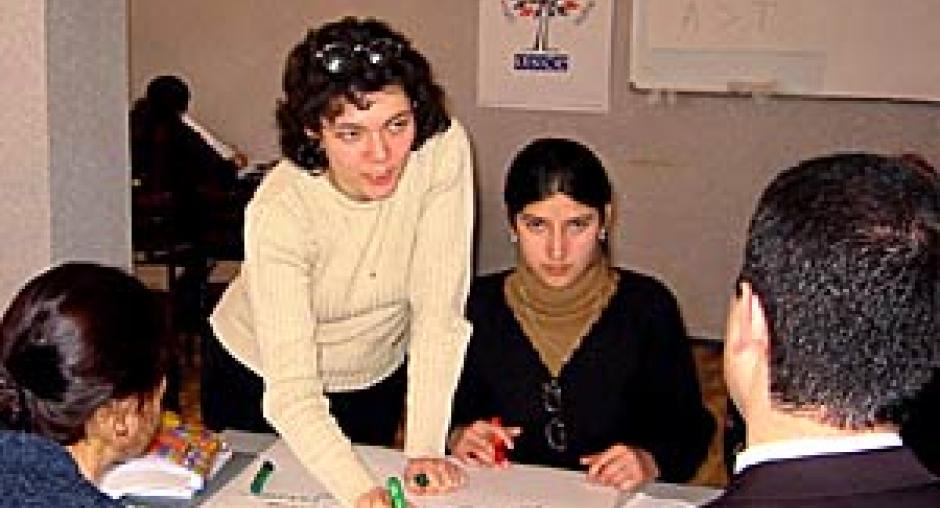Newsroom
OSCE seminar brings Tajik authorities and NGOs together for prison reform talks
DUSHANBE 12 February 2004

(OSCE)Representatives of non-governmental and international organizations discussing prison reform with Tajik government officials in Dushanbe, 13 February 2004. (OSCE) Photo details
DUSHANBE, 12 February 2004 - Representatives of more than 30 non-governmental organizations, international organizations and the Tajik Government discussed prison reform for this Central Asian state at a three-day seminar that ended today.
Initiated by the Tajik NGO, the Bureau of Human Rights and Rule of Law, the seminar and the following roundtable were organized by the OSCE Centre in Dushanbe, the OSCE Office for Democratic Institutions and Human Rights (ODIHR) and the Prison Administration of Tajikistan.
"Close co-operation between the civil society and the administration of detention facilities is an indicator of the level of good management of the prison system," said Kuat Rakhimberdin, Regional Director of the Kazakhstan International Bureau for Human Rights and Rule of Law (KIBHR).
"This is what we want prison reforms to achieve," he said.
Prison authorities, including the Head of Tajikistan's Prison Administration, Alihon Rahmonov, expressed their support for the idea of developing such co-operation.
International experts from the ODIHR, KIBHR and the Armenian Justice Ministry presented the international standards, legal framework and relevant experience of co-operation of NGOs with prison administrations.
Participants recommended developing a working document setting up the framework for future co-operation.
Essential components of such a framework would include the rights and obligations of both sides and clear rules for NGO access to places of detention.
Initiated by the Tajik NGO, the Bureau of Human Rights and Rule of Law, the seminar and the following roundtable were organized by the OSCE Centre in Dushanbe, the OSCE Office for Democratic Institutions and Human Rights (ODIHR) and the Prison Administration of Tajikistan.
"Close co-operation between the civil society and the administration of detention facilities is an indicator of the level of good management of the prison system," said Kuat Rakhimberdin, Regional Director of the Kazakhstan International Bureau for Human Rights and Rule of Law (KIBHR).
"This is what we want prison reforms to achieve," he said.
Prison authorities, including the Head of Tajikistan's Prison Administration, Alihon Rahmonov, expressed their support for the idea of developing such co-operation.
International experts from the ODIHR, KIBHR and the Armenian Justice Ministry presented the international standards, legal framework and relevant experience of co-operation of NGOs with prison administrations.
Participants recommended developing a working document setting up the framework for future co-operation.
Essential components of such a framework would include the rights and obligations of both sides and clear rules for NGO access to places of detention.
